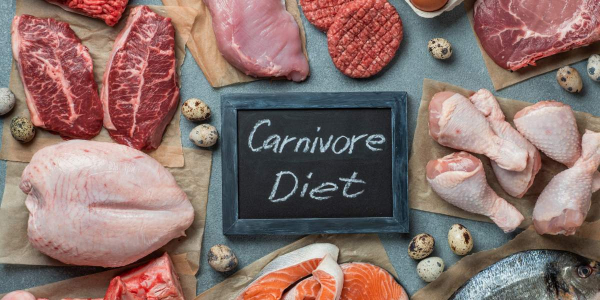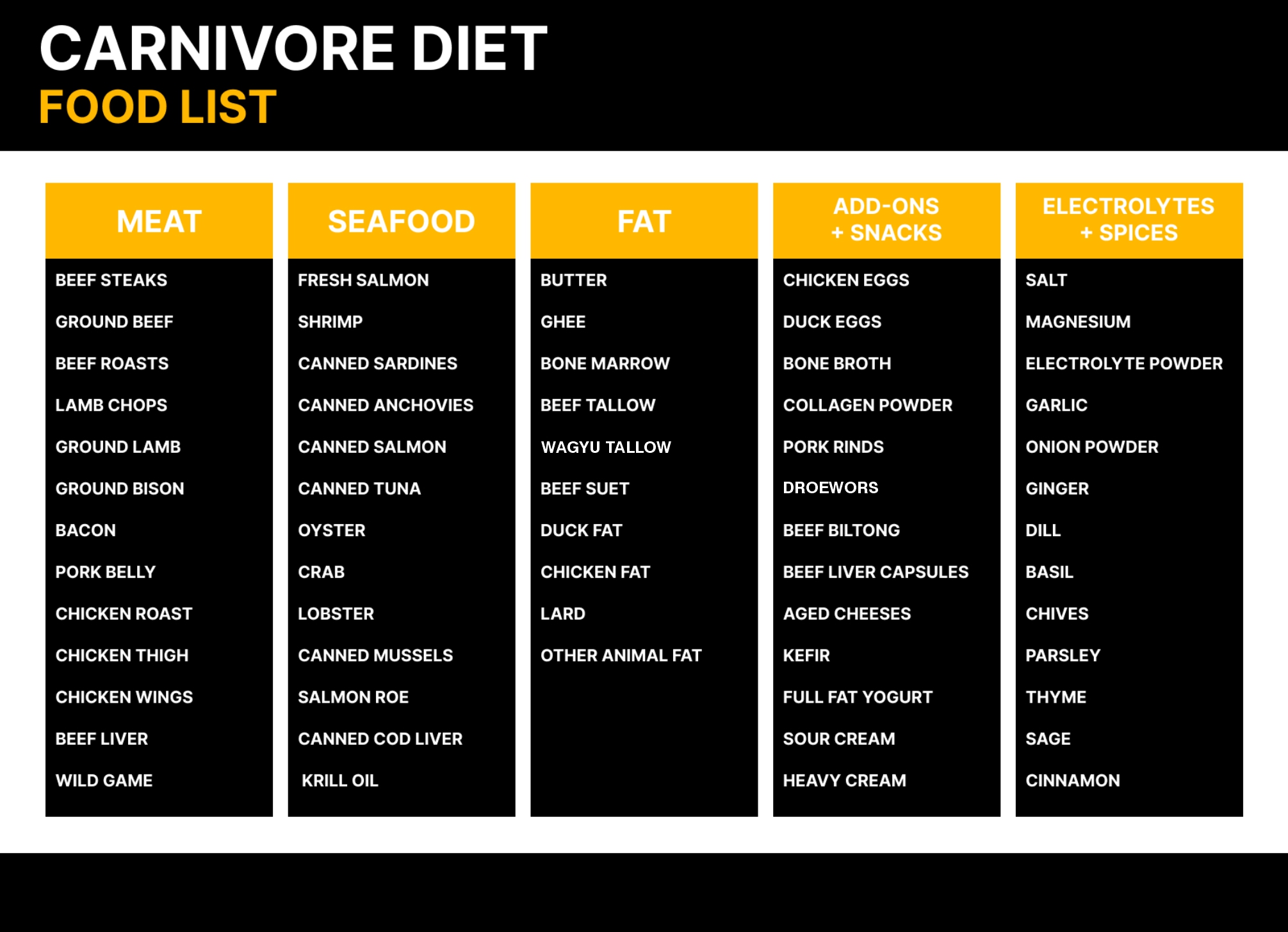Carnivore Diet: Sculpt Your Body, Ignite Your Energy, Own Your Life

In stark contrast to veganism, the carnivore diet is composed of exclusively animal products, mainly meat. Though this goes against the common consensus that whole plant foods are healthy, thousands of people have experienced miraculous results after going on a 100% carnivore diet meal plan, myself included.
In 2021, Harvard University published a study looking at how a carnivore diet affected the health of more than 2000 people. At the end of the 6 month trial, the researchers concluded that “contrary to common expectations, adults consuming a carnivore diet experienced few adverse effects and reported health benefits and high satisfaction.”
- 98 percent improved conditions related to diabetes
- 97 percent improved gastrointestinal symptoms
- 96 percent improved psychiatric symptoms
- 95 percent improved in overall health and high levels of satisfaction
- 93 percent improved or resolved obesity and excess weight
- 93 percent improved hypertension
- 84 to 100 percent reduced diabetic medication use
And here’s an interesting twist: take a look at how YouTube is banning and censoring information that challenges mainstream health narratives. The keto and carnivore diets are in the firing line, facing heavy suppression. Youtubers are even paid to spread fear and misinformation around these diets. Why? Because these diets are turning the tables, rapidly healing people, and suddenly, the reliance on doctors and drugs is taking a back seat. It’s a game-changer, and guess who’s losing out BIG TIME! The status quo is facing a formidable challenge.
If you're eating a sufficient amount of meat, you're much less hungry and don't feel the need to snack. I'm eating less than I ever have and I'm the healthiest I've ever been - STELLA YOUNG
What Is The Carnivore Diet?
The carnivore diet is a straightforward eating plan: you consume only animal-based foods and products, with all other food categories restricted. It’s like an elimination diet on steroids, cutting out all processed foods and focusing on animal-sourced options. Think venison, lamb, eggs, beef, organ meats, bone broth, bone marrow, seafood, pork, poultry, low-lactose dairy and more.
While initially appearing unconventional, some proponents argue that plant foods are not essential for survival. They posit that carbohydrates, primarily found in plants, are the only non-essential macronutrient. According to this perspective, fats and proteins are vital for our bodies to thrive, whereas carbohydrates are not as necessary. From my own experience over the past 12 months, I have found that to be true.
Popular podcasters like Joe Rogan, Lex Friedman, Jordan & Mikhaila Peterson, and renowned health experts such as Dr. Shawn Baker, Dr. Anthony Chaffee, Dr. Robert Cywes, Dr. Ken Berry, Dr. Robert Kiltz, and more are creating a buzz about it. Even high-performance athletes like world-class mixed martial artist George St. Pierre, pitcher Noah Syndergaard, and Rugby star Curtis Sironen are swearing by it for peak performance. What’s causing all the excitement? The Carnivore Diet. It’s not just a passing trend; it’s a revolutionary approach, and these influential figures are living proof.
Thousands of people have reduced or even reversed symptoms of diabetes, digestive issues, depression, mental disorders, skin conditions, joint pain, hormonal imbalances, lyme disease, chronic fatigue, candida overgrowth, pain, inflammation, etc.
My Weight Loss Rollercoaster
From a young age, I was a ball of energy, diving into sprinting, swimming, tennis, high jump, and gymnastics during my primary school years. But in 1989, at the age of 12, a gymnastics session took an unexpected turn—I broke my arm during a backflip.
That injury marked the beginning of my weight gain journey. Unable to maintain my usual exercise routine, I stuck to my accustomed eating habits – 3 large meals a day, plus plenty of snacks. My activity level never went back to what I was used to resulting in weight gain year over year.
Fast forward to November 10, 2022—I had ridden the rollercoaster of countless diets: vegan, raw vegan, vegetarian (and all it’s variants), pescatarian, military diet, Herbalife, low fat, 5-2 diet, Mediterranean, Zone, Atkins diet, and a couple of highly questionable weight loss tactics. All proved futile and unsustainable, especially for someone seeking practical, sensible dietary solutions. After each diet, my weight rebounded, and then some.
Enter the carnivore diet, and a year down the road, I’ve shed 18kg, transformed into a happier version of myself, and, if I may say so, a more well-rounded individual too. Forget the days of relentless hunger and binge eating—they’re a thing of the past. I’ve never experienced such contentment and harmony with food in my entire life! That, to me, is hitting the jackpot!
From Vegan to Carnivore
From guilt-tripped vegan to thriving carnivore: My journey in a nutshell. Inspired by ‘Earthlings,’ I embraced a vegan diet, thinking it was a noble stand against animal cruelty. Little did I know about the unseen consequences—soil tilling wiping out small animals, pesticides harming insects and humans, and even shooting predators to protect crops.
Enter Mike Archer’s revelation: producing wheat protein results in 25x more animal casualties than beef protein. A wake-up call for vegans.
Personal vegan struggles followed—hair loss, weakened teeth, irregular periods, brain fog, and depression. Reintroducing fish brought relief and a 90% improvement. Veganism wasn’t meeting my nutritional needs.
Cue the carnivore diet—a game-changer. My mood is stable, hormones are happy, and my monthly cycle is a breeze. I am in total control of my hunger. In fact, I only get hungry around 14h00-15h00 most days, and during the week leading up to my cycle, I might have two meals a day between 11h00-15h00. The carnivore lifestyle has truly transformed my well-being.
As I’m still in the process of losing weight, I am currently utilising a PSMF approach for faster weight loss. CLICK HERE if you want to skyrocket your weight loss results!
Plants vs Meat : Why I Stopped Eating Veggies
Alright, let’s cut to the chase. Oxalates – ever heard of them? They’re one of those natural plant toxins plants use to fend off the creepy crawlies, and guess what? We’re on the receiving end as the predators.
Now, for ages, we’ve been spoon-fed the idea that veggies are the ultimate health heroes. They’re supposed to be the Avengers against cancer, the detox squad for our digestive systems, and the knights in shining armour rescuing us from heart disease – the superheroes of a healthy diet.
But hold the salad! Recent research is turning the spotlight on the veggies’ dark side. Behind the green goodness, they’re packing plant toxins, antinutrients, and phytochemicals that can mess with us on a cellular level. These troublemakers trigger immune reactions leading to chronic inflammation and disease. And guess what? Oxalates are leading the pack as one of the heavyweight plant toxins we’re unwittingly chowing down on.
Even within the contentious landscape of the carnivore diet, one assertion stands out as particularly controversial. Here, I’ll present two potentially unsettling claims:
- Vegetables are not essential.
- Vegetables might be harmful to a significant portion of the population.
Let’s peek into the plant’s perspective. Veggies are like Fort Knox – they don’t want to be eaten, and they’ll go to great lengths to protect their precious DNA. Now, fruit, on the other hand, is the cool kid in the plant world. Plants WANT their fruit to be devoured so the seeds can hitch a ride to a new home, BUT that doesn’t mean you’ll thrive on them as they’re still high in fructose which will spike your blood sugar levels and mess with your hunger signals. I tried to reintroduce fruit for a day and bang!, my cravings came back and my blood sugar was out of control the rest of the day. When you’re on a clean diet such as the carnivore diet, it’s easy to see which foods trigger you when you reintroduce them one at a time. Also, the point is to control your blood sugars, especially if you’re on a weight loss journey.
Defining what is considered healthy involves understanding the fundamental reasons behind our eating habits. It’s akin to absentmindedly opening the pantry repeatedly without a clear purpose.
In my interpretation, the distinction between healthy and unhealthy can be summarized as follows:
Unhealthy: Fails to meet the body’s nutrient requirements and leads to adverse consequences.
Healthy: Meets the body’s nutrient requirements without resulting in adverse consequences. Our primary motivations for eating are centered around obtaining:
We eat for two main reasons: Energy + Essential Nutrients. As humans are heterotrophs, our bodies lack the ability to produce all necessary components independently, necessitating the intake of specific nutrients from our diet.
The three essential macronutrients are protein, carbohydrates, and fat, vital for proper bodily function.
Additionally, there are four indispensable classes of micronutrients:
- Vitamins (A, B, C, E, K, Choline, Folate, etc.)
- Minerals (Magnesium, Calcium, Phosphorous, Potassium, Sodium, Ionide, etc.)
- Fatty Acids (Omega 3 and Omega 6, etc.)
- Amino Acids (Isoleucine, Leucine, etc.)
When seeking healthy food options, the focus should be on nutrient density, a reliable energy supply, and the absence of adverse side effects. Biochemically, animal products are the only sources where we can get all our macro and micronutrient needs.
Vitamins A, B12, D and K2 — nutrients that we cannot function without — are not prevalent at all in plant foods.
While a separate issue, this is also a huge contributing factor to the mental health crisis today. Vital nutrients such as DHA, B12, Iron, and selenium play a crucial role in brain health. Depriving the brain of these nutrients by excluding animal products can have adverse effects.
Humans have the capacity to sustain themselves solely on animal products, a feat not achievable with plants or carbohydrates.
A properly designed carnivore diet, incorporating beef steak, beef liver, and eggs, ensures 100% nutrient sufficiency.
Animal products outperform plant-based sources in every nutrient category, with the exception of Vitamin C. However, due to glucose ascorbate antagonism, even with lower Vitamin C intake on a carnivore diet, absorption is likely higher.
In summary, steak and beef liver surprisingly emerge as the pinnacle of a balanced diet, providing the perfect quantities of essential macro and micronutrients. Plant foods often contain nutrients in less bioavailable forms, making it harder for our bodies to absorb compared to their animal counterparts. For example:
- Vitamin K2 more important than Vitamin K1
- DHA is more important than ALA
- Heme Iron is more bioavailable than non-heme iron
- Vitamin A retinol is more bioavailable than Vitamin A carotenoids
- Vitamin D3 is more bioavailable than Vitamin D2
Animal foods contain all the highly bioavailable nutrients, unlike plant foods. Numerous food companies attempt to mislead consumers into thinking that all forms of nutrients, such as Vitamin A, are equivalent. Fortunately, as you’re reading this, you won’t be deceived.
A significant portion of the population suffers from nutrient deficiencies. This deficiency often leads to persistent hunger, prompting individuals to repeatedly reach into their pantries. The main contributing factor is that people rely on vegetables and carbohydrates to satisfy their hunger when, in reality, turning to animal foods would be more nutritionally beneficial.
Illness isn't caused by a drug deficiency. It is caused by improper nutrition and the body's inability to absorb nutrients from the food we eat.
Carnivore Diet: Food List
Foods to Eat on Carnivore Diet:
- Meat: beef, lamb, pork, mince, venison, chicken, turkey, duck, etc.
- Fish & Shellfish: salmon, oysters, mussels, tuna, mackerel, sardines, snoek, crab, etc.
- Animal Products: eggs, bone marrow, lard, ghee, bone broth, etc.
- Low-lactose dairy products (in small amounts): butter, heavy cream, hard cheese, etc.
- Seasonings (with no carbs): salt, black pepper, etc.
- Water
Foods to Avoid on Carnivore Diet:
- Fruits: apples, oranges, bananas, berries, etc.
- Vegetables: asparagus, mushrooms, broccoli, peppers, etc.
- High-lactose dairy: soft cheese, milk, yogurt, etc.
- Legumes: beans, lentils, etc.
- Nuts and seeds: walnuts, almonds, pistachios, sunflower seeds, etc.
- Grains: oatmeal, wheat, bread, rice, quinoa, etc.
- Alcohol: beer, wine, liquor, etc (your body cannot use fat for fuel when alcohol is in your system).
- Sugars: white sugar, brown sugar, honey, maple syrup, etc.
- Beverages other than water: coffee, soda, tea, juice, etc.
Golden Rule of the Carnivore Diet:
- Eat only animal-based products.
- Maintain a zero-carb diet.

My Final Thoughts
Discovering the simplicity of the carnivore diet has been a game-changer for me. Now, planning meals for the entire month and crafting a grocery list that aligns with my specific meal plan is a breeze with just a quick glance. This uncomplicated approach not only streamlines my diet but also makes sticking to it a walk in the park—no more complicated meal prep or the dilemma of diverse food choices. This efficient planning process has become my secret weapon, saving time and making my journey to better health a whole lot smoother.
If you’re tired of feeling overweight, unhealthy, and inflamed, consider diving into the all-meat carnivore diet. Let’s face it, we’ve all tried various fad diets, but how about giving an all-meat approach a shot?
I can personally attest to the transformative power of the carnivore diet. It reshaped my life, and I believe it can do the same for you. If I can embrace this change, so can you. It’s time to make a choice that can lead to a healthier, happier you.












